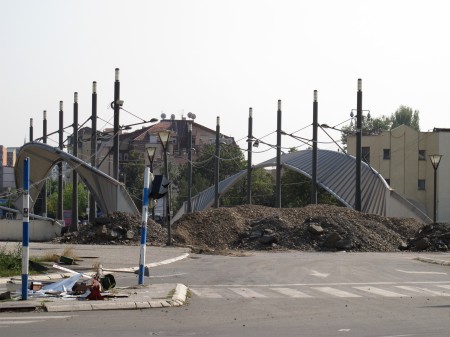
Last week’s outbreak of violence between ethnic Serbs and NATO forces at the border between Kosovo and Serbia may not have been large in scale, but this latest of a number of incidents points toward an escalation of long-simmering tensions in Northern Kosovo. The developments are not just important symbolically; disagreements over the status of the North are the main obstacle to reconciliation between Belgrade and Pristina. They have implications for the wider region and, in effect, keep Serbia out of the EU and Kosovo out of the UN.
The positions are relatively clear-cut:
- Belgrade’s motto is ‘partition, then recognition’: it has made clear that the only way it will accept Kosovo’s independence is if Northern Kosovo becomes a part of Serbia
- Serbs in Northern Kosovo, who make up a large majority of the population, uniformly identify with Serbia and refuse to be part of an independent Kosovo
- For Pristina, partition is unacceptable
- The international community also wants to avoid changes to Kosovo’s borders, for fear of destabilizing the western Balkans and playing into the hands of Kosovo’s nationalists. The EU and the US have consistently insisted that Serbia accept Kosovo’s territorial integrity and work with its government on practical matters
Although, in theory, the UN Interim Administration Mission in Kosovo (UNMIK) is still the only legitimate civilian authority in all of Kosovo, Pristina effectively rules the territory south of the Ibar river, and both Pristina and Belgrade exercise partial sovereignty over the North. The recent problems along the border must therefore be seen as part of Kosovo and Serbia’s battle over sovereignty in the contested territory.
EU-sponsored talks between Belgrade and Pristina aim to address the practical problems that arise from this ‘dual sovereignty’. On 2 July, there was a breakthrough on a number of technical matters, but Serbia postponed talks on customs issues. Pristina, partially due to domestic pressure, decided on 25 July to turn up the heat and sent units of the special police to seize two controversial northern border points. An EU-brokered 2 September agreement on customs was designed to mitigate the ensuing crisis, but the deal neglected important practical considerations. After the renewed violence at the border, Belgrade refused to continue the talks unless that, and nothing else, would be discussed. Consequently, the talks were stalled.
A map of Northern Kosovo (click on the names for more information)
The timing could not have been worse for Serbia. On 12 October, Serbia will receive its annual report from the European Commission. Belgrade has tried hard to win support its candidacy for EU membership (Mladic’s extradiction to The Hague being the most obvious example). But even if the EC recommends candidate status for Serbia, individual EU members may still not be willing to grant it. This would be a serious setback for Serbia’s current administration.
The prospect of eventual accession to the EU has been a modernizing force in much of the western Balkans and has contributed to peace and stability in the region. The focus should now be on preventing the situation from escalating. Tough stances will only hamper negotiations in the future. In this case, the EU should prefer the carrot to the stick. By being quite explicit that the current measures, designed only to address certain specific issues, will have no impact whatsoever in advancing the broader status question, the EU can do better than by simply flexing its muscle and putting Serbia in its place.
Recommended reading
The International Crisis Group’s North Kosovo: Dual Sovereignty in Practice describes the current realities in Northern Kosovo: local attitudes, Belgrade’s influence, Pristina’s limited attempts to engage, international strategy and problems in law enforcement, justice and border controls.

